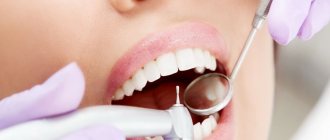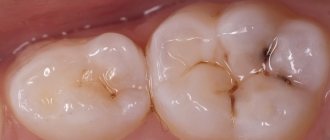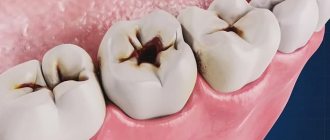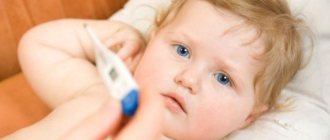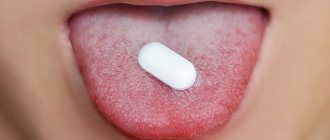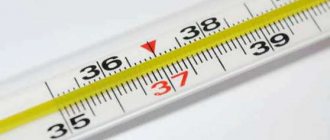Author's rating
Author of the article
Shutofedova Ksenia Yurievna
General practitioner
Articles written
578
about the author
For every mother, the appearance of a child’s first tooth is a whole event, but such joy is often overshadowed by fever, runny nose, cough, bowel movements and other unpleasant and frightening symptoms.
During the teething period, most babies behave very restlessly, are constantly capricious, and refuse to sleep and eat. Many doctors, including pediatrician Komarovsky, beloved by all mothers, believe that a runny nose and cough during the appearance of the first milk teeth is a physiological process and there is no need to worry about their presence. During this period, the main thing for parents is to create good conditions for the baby, and also to closely monitor the symptoms themselves. The appearance of cough and snot during teething is most often a specific reaction of the body to damage to the periosteum and gums by a growing tooth. Against this background, the baby’s immunity is significantly reduced, which increases the risk of a viral or bacterial infection when teething. That is why, when such symptoms appear, the child must be shown to a pediatrician who can assess the general condition of the baby and give useful recommendations to parents.
Cough during teething
Coughing during teething is not a common symptom. The nature of its manifestation allows us to determine whether it is a consequence of the disease, or whether it is caused precisely by the process of formation of new teeth.
A wet cough during the development of the first teeth in children, caused by excessive salivation, usually disappears after 2-3 days and eliminates the need for any special treatment. Examine the skin around the baby's mouth - it usually appears irritated due to expectorated saliva, which indicates the natural origin of the symptom (the expectoration reflex) during teething.
If there is a frequent cough and runny nose, as well as shortness of breath and wheezing that persists for more than 2 days, then it is necessary to invite a doctor to examine the child, since these symptoms may indicate a disease.
Also, children may experience a dry cough at this time. Most often it occurs after a child has been crying for a long time due to prolonged nasal congestion.
What the experts say
Many modern mothers love to listen and watch Dr. Komarovsky’s programs, so it will also be useful for you to know what he thinks on the topic of cough and runny nose during teething.
Komarovsky believes that often when a child begins to cough at the age of six months and older, parents cannot always adequately assess the situation on their own; they are sure that teething is the cause. Although viral diseases are also to blame, to which the baby becomes especially susceptible from this age due to the characteristics of the immune system. However, if the baby is active, then the doctor sees no reason for concern, but still advises to consult your pediatrician in any situation.
Notice
: Undefined variable: post_id in
/home/c/ch75405/public_html/wp-content/themes/UltraSmile/single-item.php
on line
45 Notice
: Undefined variable: full in
/home/c/ch75405/public_html/wp-content /themes/UltraSmile/single-item.php
on line
46
Rate this article:
( 3 ratings, average: 5.00 out of 5)
prevention
Consulting specialist
Varlamova Tatyana Vitalievna
Specialization: Dentist-therapist Experience: 6 years
How to treat
First of all, during a severe cough, it is necessary to eliminate the pain from teething. To do this, the baby should be offered to chew a chilled teether or massage the gums. If the pain does not disappear, then it is advisable to use medications in the form of gel, ointment, syrup or rectal suppositories.
Online consultation with a doctor of the highest category : “...can teething be accompanied by a cough?”
To prevent the baby from being tormented by a night cough while teeth are growing, it is recommended to regularly rinse the nose with a special bactericidal solution from the pharmacy, a self-made product based on salt or medicinal plants. This will prevent drying out and accumulation of mucus. In addition, as prescribed by a doctor, various drops/sprays can be used to moisturize the nasal sinuses: “Aquamaris”, “Salin” and others.
Due to the fact that a runny nose and cough can be a consequence of an infectious disease or acute respiratory infection, Dr. Komarovsky recommends that after the formation of baby teeth begins, ask your pediatrician what immunostimulating drugs can be given to children during this period in order to increase the body’s protective functions.
When wondering how to treat a cough during the appearance of molars, you should also remember about simple folk methods. For example, you can achieve natural flow of phlegm and saliva along the wall of the larynx without drugs or rinses by lifting the child’s head when he is lying in the crib. In addition, it is recommended to regularly offer your baby his favorite drinks and ventilate the room - these measures will reduce the likelihood of inflammation and prevent the mucus from drying out.
Comments
What kind of throat should it be if a child has a cough due to teething?
Kelli (03/21/2019 at 02:11) Reply to comment
- Normally, the neck should be pinkish, but during teething it may turn red. If a child has a red throat, it is recommended to consult a pediatrician, and if there is plaque on the oral mucosa, a trip to the doctor should not be ignored at all, because it can signal the development of a sore throat, which at such a young age is very severe.
Editorial staff of the portal UltraSmile.ru (03/24/2019 at 10:18 am) Reply to comment
Write your comment Cancel reply
Signs of snot in a child
Symptoms of snot on teeth are:
- increased salivation;
- the child does not sleep well;
- the baby's appetite has decreased;
- diarrhea appeared.
During teething, your baby's temperature may rise. This is explained by a large accumulation of active components. If the temperature rises above 38 and lasts more than three days, parents should definitely contact their pediatrician.
A baby’s snot may also be accompanied by a cough. A large amount of mucus forms in the child’s mouth, which, when it gets into the back of the throat, irritates it and causes a cough. In this case, you also need to make sure that the cough is not caused by a virus, but is associated with teething.
Strengthening the baby's immunity
Timely vaccinations for the baby play an important role in this matter, since in this way it is possible not only to strengthen the baby’s immune system, but also to develop protection against various serious diseases. The vaccination calendar in all countries is almost the same, since it is developed taking into account the state of the body of children at a certain age. Parents who try to refuse vaccination or postpone it to a later date are often playing with fire and risking the health of their child.
Hardening gives excellent results, so it is better to start it as early as possible. For newborns, for hardening, it is enough to do contrast dousing procedures on the arms to the shoulders, using alternately cold (+20°) and hot (+35°) water, gradually increasing the area of the treated skin and the duration of the session.
The baby will not feel much difference in the temperature of the water, so it will not experience negative sensations, but this will be enough to stimulate the immune system.
It is also necessary to harden mucous crumbs; they must respond quickly to changes in ambient temperature, and this requires frequent training
It is important that the baby is often outdoors
A balanced diet plays a significant role in strengthening the immune system of newborns, so it is very important to maintain breastfeeding. With mother's milk, the baby receives a sufficient amount of antibodies that protect his body from many infections and diseases.
After a child switches to a more varied diet, it is necessary to maintain the correct balance of microelements and vitamins in the body.
What you need to know about first teeth?
We recommend reading: What can an asymptomatic jump in temperature mean in a child?
Author
Irina Vaganova Doctor
All articles by the author
I like!
Types of coughing in infants
Even if the baby’s first teeth have not yet erupted, from 4 months parents should be especially attentive to the child. Their task is to make the process as easy as possible for the baby and contact the pediatrician in time if there is a problem. If your baby has a cough, you should analyze the characteristics of the symptom.
Dry or wet
A nonproductive reflex accompanies a dry throat in a baby. This is the result of irritation of the mucous membranes by dry warm air. The symptom is provoked by elevated temperature, which often accompanies teething. When the body is hot, the process of moisture evaporation accelerates.
Parents need to monitor the microclimate in the room:
- maintain the temperature within 18‒21℃;
- optimize humidity (about 63%);
- carry out cleaning (daily dusting);
- monitor your drinking regime;
- ensure a flow of fresh air (ventilate the room).
It is important to ensure that nothing interferes with the child’s normal nasal breathing. To do this, regularly remove mucus from the nose, moisturize the membranes with sprays (Aquamaris, Meralis, Humer), and if necessary, use vasoconstrictor drops
If, despite all the measures taken by your baby during teething, a dry cough continues to bother you, you should contact your pediatrician.
A wet cough is much more common. It is caused by the evacuation of mucus flowing down the throat. The baby experiences regular, single urges, during which the discharge of sputum is clearly audible.
To help a child cough, parents should promptly remove secretions from the nasopharynx using an aspirator or small syringe. You should take a closer look at the nature of the discharge. If a wet cough is accompanied by the rejection of watery, clear mucus, there is nothing to worry about. Cloudy, viscous, yellowish or green sputum is a signal of respiratory tract disease.Night or day
If parents suspect teething, they need to monitor when and how often their child coughs. A rare daytime cough or periodic multiple urges at night can be considered a common occurrence.
In the first case, the dryness of the mucous membranes is to blame, in the second, the movement of secretions along the back wall of the pharynx. If the frequency of coughing attacks is the same at different times of the day, it is better to consult a pediatrician.
Strong or weak
Intense multiple reflexes occur if the baby chokes on saliva or mucus. The rest of the time, the child’s cough is weak, with occasional urges.
If your baby has seizures, you should immediately consult a doctor, despite teething. Similar actions are required when the urge is accompanied by wheezing and bubbling in the chest. If a cough leads to breathing problems (the baby turns blue, red, blood vessels on the face are clearly visible), you should call an ambulance or take the baby to a medical facility as quickly as possible.
Solutions to the problem
If your baby’s runny nose is associated with teeth, you should act in two directions. Firstly, to treat rhinitis, and secondly, to remove pain and swelling of the gums. We will tell you how to help your baby get rid of mucus from his nose and recommend how to alleviate his condition. In addition, we list the main methods and medications that will help cope with swollen gums.
Treatment of rhinitis
If your baby's snot is not thick, transparent or slightly whitish, you can deal with it yourself. Mom will need an aspirator - a rubber bulb with a plastic nozzle, a diaper and a saline solution in the form of drops, which can be purchased at the pharmacy. Next you should proceed like this:
- Swaddle the baby, securing his arms in the swaddle. This way it won’t interfere with the mother’s cleaning the nose (we recommend reading: how to clean a newborn baby’s nose and video).
- Place 1-2 drops of saline solution into each nostril. Wait a couple of minutes, you can massage the wings of your nose a little.
- Then squeeze the aspirator in your hand to squeeze the air out of it. Pinch one of the baby's nostrils with your finger, attach the nozzle to the other and try to vacuum the mucus out of the baby's nose. This operation is not difficult, however, it requires some skill.
- Repeat with the other nostril.
It is important to clean your child's nose for normal breathing.
There are other devices for cleaning the nasal passages. After the procedure, you can drip vasoconstrictor drops into your nose to avoid subsequent nasal congestion and irritating sneezing.
It is important to use only those intended for children under one year old. Sometimes the use of drops is not required at all
If after cleaning the nose the child breathes independently and does not sniffle during sleep, the drops can be used only before bedtime.
It also makes sense to position the baby so that the upper part of the body is slightly higher than the lower part. A runny nose during teething, just like regular rhinitis, prevents you from breathing through your nose at night. A small elevation under your head in the form of a flat and dense pillow will not hurt. Mucus from the nasal passages will flow into the throat, the swelling will subside a little, and it will be easier for the baby to breathe.
We alleviate the child’s condition
A teether will help distract your child from the unpleasant symptoms of teething.
Next, you should alleviate the baby’s condition. It happens that the baby is capricious, lethargic, he constantly puts foreign objects into his mouth. The sequence of actions for gum inflammation should be as follows:
- If the mother is absolutely sure that her son is teething - he cries, is capricious, refuses the pacifier - you can give him a painkiller. Ibuprofen-based drugs work great - they not only relieve fever, but also reduce pain. However, you should not abuse them; you can give them at night so that the child gets enough sleep. How many days can ibuprofen be given? According to pediatricians, it should not be used for more than 3 days.
- It is advisable to treat the gums with a topical gel, for example, Kamident. It needs to be placed behind the cheek so that a layer of gel of 2-3 mm forms on the surface of the gum. This drug will help relieve pain in the gums and also relieve swelling.
- Some pediatricians advise giving your child homeopathic medicines; Dentokind is suitable. The manufacturer promises that the product will help get rid of discomfort, relieve swelling, pain and even help normalize the temperature. The tiny tablets dissolve easily in water and are recommended to be given to infants once an hour on peak days. It is believed that this remedy has a cumulative effect, and the child will not feel relief immediately, but only after a while.
- Sometimes children like special devices that they can chew on. For example, pharmacies sell plastic rings. They can be cooled before offering them to your baby. Cold plastic soothes itchy gums a little. However, it is worth remembering that rhinitis is not the best period for chilled toys.
- The water-salt balance in the baby’s body should be maintained. If your baby doesn't eat well, you can give him some water from time to time.



